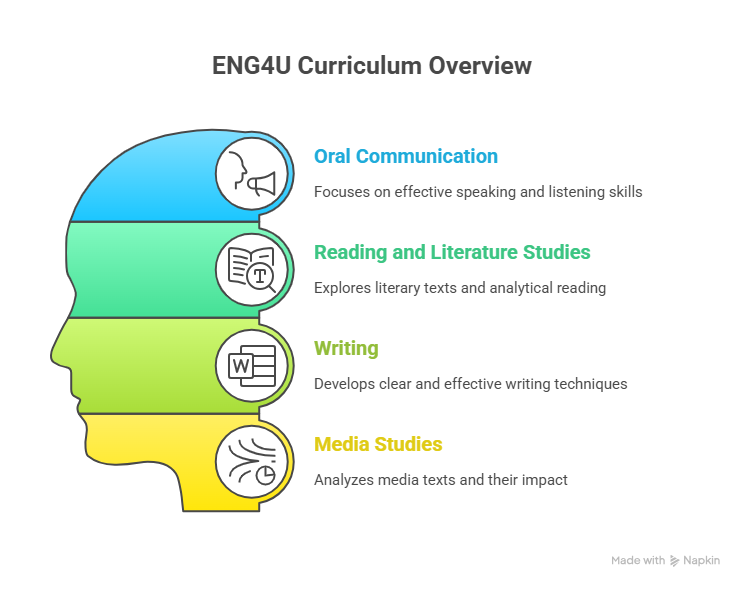Key Highlights of ENG4U Course Outline
Here is a quick look at what you can expect from the ENG4U course outline:
- The ENG4U course outline is your main guide for Grade 12 University Preparation English in Ontario. It follows what is set by the Ontario curriculum.
- This course helps you build stronger critical thinking and communication skills. You will need these for university English classes.
- You will get to use advanced reading strategies as you look at many complex literary texts and media.
- ENG4U expectations ask you to use academic language with confidence in how you write and speak.
- You will be assessed through essays, presentations, and a big Independent Study Unit (ISU).
Introduction
Are you a high school student in Ontario who is about to start your last year? If yes, you are likely getting ready for ENG4U. This is the Grade 12 University Preparation English course. You need to take this course if you want to move on to more school after high school. The course lets you build skills for later, so you need to know what is inside it.
The ENG4U course outline is made by the ministry of education. The outline tells you what you will do. You will read and think about important books. You will learn how to write for school. This guide will help you understand what you need to know and make everything easy to follow.
Why the ENG4U Course Outline Matters
You may wonder why knowing the ENG4U course outline is important. Think of it as a roadmap for the semester, detailing what the ministry of education expects and what your teacher requires. Familiarizing yourself with the outline allows you to anticipate assignments, manage your time effectively, and understand the primary goals of your learning.
The outline connects each unit and assignment to a larger objective: preparing you for post-secondary challenges. It’s more than just a checklist; it empowers you to take control of your education. Understanding the purpose behind your work enables you to meet and exceed learning expectations, paving the way for your future.
ENG4U Course Outline: Unit-by-Unit Breakdown
The ENG4U course outline is structured to build your skills progressively throughout the school year. You’ll journey through different literary forms and various periods, starting with foundational theories and moving toward independent analysis. Each unit has unique goals and evaluation strategies designed to deepen your understanding of English.
To give you a clearer picture, here is a typical sequence of units you might encounter. The following sections will explore what each of these units involves, from the initial study of literary criticism to your final independent project, utilizing a variety of mediums.
| Unit Order | Unit Name | Suggested Time |
|---|---|---|
| Unit 1 | Literary Criticism | 20 Hours |
| Unit 2 | Shakespearean Drama | 20 Hours |
| Unit 3 | The Novel Study | 25 Hours |
| Unit 4 | Essay Analysis | 20 Hours |
| Unit 5 | Course Summative (ISU) | 12 Hours |
Unit 1: Literary Theory and Criticism
Your journey into ENG4U begins with literary theory, introducing you to various “lenses” for analyzing texts. You’ll explore feminist, Marxist, and psychoanalytic criticism to understand how a story’s meaning can change depending on your perspective. This unit pushes you beyond summarizing plots, encouraging you to ask deeper questions about meaning and structure. These theories give you reading strategies you’ll use throughout the course. While challenging, this unit transforms your approach to literature and prepares you for university-level work. Understanding these critical frameworks is essential for developing creative and analytical thinking skills that will benefit you in all future studies.
Unit 2: Shakespearean Drama
Next, you will read some of Shakespeare’s famous works. The words he uses might seem hard at first, but the class will help you get used to it. Lessons are designed to help you understand his plays and show how they still relate today. You’ll discuss themes like power, love, and sadness ideas people care about now. Studying these texts is key in ENG4U, teaching you to break down tough language and analyze character growth. Through class discussions, acting, and essays, you’ll see why Shakespeare is important. This unit helps you think deeply and builds confidence in academic reading.
Unit 3: The Novel Study
The novel study is a key part of the ENG4U course, focusing on analyzing a complex story in depth. You might read classics like Nineteen Eighty-Four or a Canadian novel such as The Wars. In this unit, you’ll do more than just read you’ll explore characters, themes, narrative structure, and the author’s style, applying literary theories learned earlier. Strong reading strategies are essential: you’ll annotate, interpret symbols, and gather evidence for essays or presentations. Spending time with one novel prepares you for longer, more challenging reading lists in college or university, helping you develop advanced literary analysis skills.
Unit 4: Essays and Non-Fiction
A big part of ENG4U is improving your writing skills. In this unit, you will focus on essays and read non-fiction, learning to make clear and strong points. An important focus is to help you create convincing arguments supported by solid evidence. You’ll use your creative thinking skills to choose thesis statements and make your ideas connect smoothly. Organizing your thoughts clearly and using academic language is important for discussing complex topics. Writing strong essays is a key part of assessment in ENG4U and helps prepare you for future studies. This unit builds confidence and clarity in your writing.
Unit 5: Independent Study Unit (ISU)
The Independent Study Unit (ISU) is the final major project in ENG4U. It allows you to select literary texts that interest you and conduct independent research. For this unit, you work on your own, create your own thesis, and find secondary sources to support your ideas. You present your findings through different formats, such as a research paper or seminar. The ISU is crucial for your final grade, with evaluation focused on the depth of your analysis, research strength, and presentation clarity. It’s a chance to showcase everything you’ve learned in ENG4U, using literary texts that reflect your interests.
Core Learning Strands in the ENG4U Curriculum
The ENG4U curriculum follows the Ontario curriculum. It has four main topics called core learning strands, including graphic texts. These are Oral Communication, Reading and Literature Studies, Writing, and Media Studies. All of them connect with each other and give you a complete way to learn.
These topics help you get better at literacy in many ways. If you have an IEP, there are accommodations that can help in every part of the course. In the next parts, you will see what each learning strand is about.

Oral Communication
Oral communication is a key skill in the ENG4U curriculum, focusing on how you express ideas and actively listen to others. It’s not just about public speaking, but also about having thoughtful conversations, understanding different perspectives, and communicating confidently in various settings. You will practice these skills in group discussions, debates, and presentations. The aim is to use academic language appropriately, convey complex ideas clearly, and respond meaningfully to others. Listening skills are equally important in this strand.
You will be working on different skills, like:
- Listening to other people, understanding what they say, and replying in a variety of forms.
- Using speaking skills to talk with different types of people.
- Thinking about your own strengths and what you need to get better at as a listener and a speaker.
Reading and Literature Studies
The Reading and Literature Studies strand is central to ENG4U. Here, you will explore a variety of literary texts such as poetry, short stories, novels, and plays. The goal is not just to understand the plot, but to think deeply about the meanings and ideas behind each text. You’ll use different reading strategies to study how authors use form, language, and literary devices to communicate their messages and create subtext for particular purposes. You’ll also notice how different types of texts plays, poems, and stories use unique techniques to present ideas. This strand is key for building strong literacy skills that are essential for college or university. Ultimately, it helps you read thoughtfully, analyze texts, and express your own interpretations.
Writing
The Writing strand focuses on helping you express your ideas clearly and effectively in writing. It’s about more than just correct grammar and spelling—you’ll learn to create texts that are strong, meaningful, and suited to different audiences and purposes. You’ll explore how to brainstorm, organize your thoughts, draft, revise, and make style choices to strengthen your writing. Evaluation strategies will help you ensure your arguments are clear and your evidence is convincing. Whether you’re writing essays, research papers, or creative pieces, this strand gives you the tools to improve. Editing and revising your work prepares it for submission.
Media Studies
In today’s world, media is everywhere. The Media Studies strand in ENG4U teaches you to analyze and understand different media texts, such as films, advertisements, websites, and social media. You’ll learn how these messages are constructed, how they capture attention, and how to identify bias and underlying opinions. This helps you develop critical thinking skills to question what you see and hear in daily life. Additionally, you’ll create your own media texts using what you’ve learned about media techniques. This hands-on experience helps you appreciate the influence and complexity of media in the way we communicate today.
Tips for Succeeding in ENG4U
Success in ENG4U does not only come from natural talent. You also need good habits and to put in the work. It is very important to be good at time management and have study skills that work for you. The course will ask you to read and write often. If you start to fall behind, it can be hard to catch up.
To keep up with the work and get a good grade, use the tips in the next sections. There is advice here for ENG4U exam preparation, and you will find help with other resources too. You will get the tools you need to build your creative thinking and be at your best in ENG4U.
Effective Study and Time Management Strategies
Managing the workload for ENG4U requires planning and consistent study habits. Instead of cramming, review materials a little each day and engage actively with texts by taking notes and asking questions. Summarize chapters in your own words for better understanding. Time management is crucial track major due dates on a calendar and break large tasks, like the ISU, into smaller steps to reduce stress and improve results.
Here are a few strategies to help you plan your next steps:
- Create a weekly study schedule and stick to it.
- Dedicate specific times for reading, writing, and reviewing feedback.
- Work on assignments in stages: brainstorming, outlining, drafting, and revising.
- Form a study group to discuss texts and share insights.
- Always start assignments early to leave plenty of time for revision.
Resources for Extra Help and Practice
Don’t hesitate to ask for extra help if you need it. ENG4U in a virtual school can be challenging, but using the right resources including support from USCA Academy helps you understand lessons, improve your English, and boost your final grade. Your teacher is available; reach out with questions or for explanations.
Utilize online tools outside class. Sites like Purdue OWL offer writing, grammar, and citation guides. In a virtual school setting such as USCA Academy, review each lesson online, join forums, and message your teacher anytime.
Here are places where you can get extra help and practice your skills:
- Purdue OWL: Free guides for writing and MLA style.
- Your School’s Library: Librarians can help you find information for your ISU.
- Online Tutoring Services: Get support for Grade 12 English.
- Course Provider Websites: Schools like USCA Academy share sample ENG4U outline PDFs.
- Study Groups: Review and learn with classmates.
Why Our ENG4U Program?
Choosing the right place to learn makes a big difference for your success in Grade 12 English. Our ENG4U program at USCA Academy is designed to provide you with the flexibility and support you need to excel. Offered through a virtual school, the program allows you to progress at your own pace, giving you the opportunity to spend more time on challenging concepts or advance more quickly when you’re ready. This self-paced structure is ideal for those with busy lives or unique learning preferences.
We are committed to making our program accessible to all students. We provide extensive support for individuals with special education needs, ensuring that each student receives the accommodations outlined in their Individual Education Plan (IEP). Our dedicated teachers offer personalized feedback and are always available to assist you as you navigate your coursework. With all the resources and guidance you need, USCA Academy empowers you to achieve your academic goals.
Conclusion
The ENG4U course outline is important for helping students get ready for their studies at institutions like USCA Academy. This course puts a strong focus on the consolidation of the literacy, critical thinking, looking at literature, and good communication. It gives you the tools you need for writing and understanding at the university level. The setup of the units helps you see the full picture of literature and media.
The main parts of learning are focused on key skills you will use both inside and outside the classroom. As you start this academic journey, keep in mind that steady study habits and using all the resources you can, including those offered by USCA Academy, will help you a lot. If you have questions about the ENG4U program, you can always reach out!
Frequently Asked Questions
1. How flexible is the ENG4U Course Outline for online vs. in-person classes?
The basic Ontario curriculum stays the same in both classroom and online settings. But, a virtual school gives you more freedom. The ENG4U course outline online lets you finish the work at your speed during the school year. Also, there can be accommodations that fit the way people learn without set class times.
2. Is the Independent Study Unit (ISU) mandatory in all ENG4U courses?
Yes, the ISU is a standard and needed part of the ENG4U curriculum expectations. It is a main project that the teacher uses to look at your research, analysis, and the way you share ideas. This is done through set evaluation strategies. The ISU is important because it can be a big part of your final grade.
3. How does the ENG4U Course Outline prepare students for university-level writing?
The course is made for people who want to get ready for university English. It mostly works on your writing skills using academic language. You will learn to do research, build strong arguments, and use creative thinking when you look at particular texts. The main goal is to help student learning so you get used to what comes after high school. This way, you can move to university English more easily.
4. How often does the ENG4U Course Outline change or get updated by the Ontario Ministry of Education?
The Ministry of Education makes changes to the Ontario curriculum from time to time. This helps keep it current and useful. Sometimes, small updates happen. Big changes to the curriculum expectations for classes like ENG4U do not happen every year, especially at the beginning of the school year. The plan in use now is built from the 2007 updated guide. This gives a steady path across each school year in Ontario.









